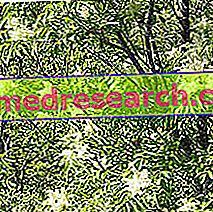Generality
Acute gastritis is the inflammation of the abrupt onset internal wall of the stomach, which associates an intense duration with a limited duration.

Inducing the phenomenon of antral gastritis is the sudden weakening of the mucus layer, which covers the inner surface of the stomach, and the simultaneous erosive action of the aforementioned surface, exerted by the acid juices necessary for the digestive process.
Among the main causes of acute gastritis (and of the disturbances just described), there are: the infections sustained by Helicobacter pylori, the abuse of common drugs such as NSAIDs, the abuse of alcoholic substances and the excessive psychophysical stress.
As a rule, to accurately treat a condition such as acute gastritis, an accurate diagnostic investigation is essential, which brings to light the triggering causes.
Brief review of the term gastritis
In medicine, "gastritis" is the word that indicates inflammation of the inner wall of the stomach.
Also known as internal gastric mucosa, the inner wall of the stomach is the complex of cell layers deputed to:
- Production of acidic digestive juices, necessary for the digestive process;
- The secretion of the mucus intended to protect the stomach from the aforementioned acidic digestive juices;
- Gastrin hormone production.
| Cellular layers that make up the inner wall of the stomach | Features |
| Epithelial layer | it is the most superficial layer (therefore in direct contact with the lumen of the stomach). It secretes the protective mucus. |
| Lamina propria | is the middle layer. It has a dense network of glands, responsible for the production of acidic digestive juices. |
| Muscolaris mucosae | is the innermost layer. It contains muscle cells, which guarantee the stomach the ability to move food towards the intestine and proceed with the digestive process. |
What is Acute Gastritis?
Acute gastritis is the inflammation of the abrupt and sudden appearance of the inner wall of the stomach, usually intense in terms of symptoms and extremely limited duration (in the order of a few days).
Acute Gastritis and Chronic Gastritis: the differences
Acute gastritis contrasts with chronic gastritis . With the expression "chronic gastritis", the doctors mean the inflammation of the internal part of the stomach with a gradual appearance, slight in terms of symptoms, lasting several weeks and a possible protagonist of relapses.
Acute gastritis and gastroenteritis are the same thing?
Acute gastritis should not be confused with gastroenteritis . The latter, in fact, is the condition resulting from the simultaneous inflammation of the inner wall of the stomach and intestine.
The fact that gastroenteritis also affects the intestine is the explanation for the presence of diarrhea, a symptom that, as we will see, is absent in acute gastritis.
Causes
The inflammation that characterizes acute gastritis is the result of the combination of two processes: the weakening of the mucus layer responsible for protecting the internal wall of the stomach as a whole or of a specific region (eg: gastric cavity -> antral gastritis ) and the corrosive action that acidic digestive juices have against the aforementioned gastric wall.
In other words, acute gastritis is the consequence of the damage that the acidic digestive juices of the stomach cause to the internal gastric mucosa, when the latter loses some of its protective mucus layer.
Did you know that ...
When gastritis, whether acute or chronic, affects the inner wall of the stomach in its entirety or almost, is called pangastrite .
Causal Factors of Acute Gastritis
A sudden weakening of the protective mucus layer of the stomach and consequently causing / promoting acute gastritis can be different factors and conditions; more specifically, among the causes / risk factors of acute gastritis, are:
- Infections supported by Helicobacter pylori . Helicobacter pylori is a bacterium normally present inside the stomach (it bears very well the acid environment) and has no health consequences. However, if the human body's immune defenses lose their effectiveness, this micro-organism is free to proliferate uncontrollably and colonize its host, causing an infection.
Encouraged by cigarette smoking and high psychophysical stress, Helicobacter pylori infection is very likely the main causative factor of antral gastritis;
- Prolonged and improper use of certain drugs, such as NSAIDs (eg aspirin, ibuprofen, naproxen, etc.) chemotherapy (eg: mitomycin and floxuridine) and colchicine;
- Prolonged abuse of alcoholic beverages (in particular whiskey, vodka and gin);

- The use of drugs like cocaine ;
- A diet with the undesirable effect of raising the acidity of the stomach . Such a diet generally consists of the excessive consumption of: fats, oils subjected to cooking, citrus fruits and coffee;
- Some viral infections, such as cytomegalovirus infections and AIDS ;
- Some fungal infections, such as candidiasis (or candidiasis ), histoplasmosis or zygomycosis ;
- Some parasitic (or parasitic ) infections, such as anisakiasis ;
- Radiotherapy performed for the treatment of a tumor;
- Very intense stress . Stressful circumstances to the point of favoring acute gastritis are, just to mention a few examples, major surgery, chronic diseases and serious injuries.
The forms of gastritis, acute or chronic, which are the result of stress are examples of nervous gastritis .
- Bile reflux . Bile reflux is the rise of bile from the duodenum to the stomach and, in the most severe cases, also to the esophagus;
- Gastric ischemia . Ischemia is the medical term that indicates a more or less serious reduction in the flow of blood in a certain tissue or organ, such a reduction as to cause a decrease in the supply of oxygen and nutrients.
Gastric ischemia is ischemia based in the stomach;
- Food allergies and food poisoning .
Who is more at risk of Acute Gastritis?
Deductible in part also from what has just been stated with regard to causative and triggering factors, the individuals most prone to develop acute gastritis are:
- Strong consumers of alcoholic beverages;
- Who makes great use of NSAIDs;
- Drug users like cocaine;
- People undergoing major surgery;
- People with kidney failure;
- Subjects with liver failure;
- Who suffers from respiratory failure.
Types of Acute Gastritis
There are two forms of acute gastritis: a less severe form, called acute non-erosive gastritis (or acute superficial gastritis ), and a more severe form, called acute erosive gastritis .
NON-EROSIVE ACUTE GASTRITIS (OR SURFACE)
Acute non-erosive gastritis is the least severe form of acute gastritis; this condition represents, in fact, a suffering limited to the most superficial cells of the epithelium that constitutes the inner wall of the stomach (it is recalled that the aforementioned epithelium is the cellular layer in direct contact with the lumen of the stomach).
EROSIVE ACUTE GASTRITIS
Acute erosive gastritis is the most severe form of acute gastritis; due to its presence, in fact, it is possible to observe scars-like lesions ( ulcers ) on the inner wall of the stomach as well as a consistent numerical decrease in the glands responsible for producing acidic digestive juices.
Acute erosive gastritis is a clinically delicate condition and therefore requires appropriate treatment.
Symptoms and Complications
The typical symptoms and signs of acute gastritis are:
- Indigestion (or poor digestion ). It is the most characteristic manifestation of acute gastritis.
Its presence is the result of the inevitable interference that inflammation produces towards the digestive process at the gastric level and the emptying of the stomach;
- Heartburn . To highlight this symptom is a localized pain in the upper part of the abdomen ( epigastric pain ), whose intensity varies from patient to patient.
At the base of heartburn there is a significant increase in levels of gastric acidity (or stomach acidity);

- Nausea, vomiting and decreased appetite . These are the three classic symptoms that accompany indigestion; therefore, they represent three quite common manifestations of acute gastritis.
Among these disorders there is the following relationship: nausea triggers vomiting and vomiting induces decreased appetite;
- Flatulence and abdominal bloating and / or abdominal heaviness . Abdominal flatulence and a sense of swelling / heaviness depend, once again, on the bad digestive process; bad digestion, in fact, causes the food to reach the digested intestine only in part and this causes its fermentation (which is the real cause of flatulence and abdominal swelling / heaviness);
- General malaise and sense of weakness . These are the direct consequences of the previous symptoms.
Complications of Acute Gastritis
In the most severe cases or in the absence of adequate treatments, acute gastritis can degenerate to the point of inducing the formation of peptic perforating ulcers . In the medical field, a piercing peptic ulcer is the expression that indicates any lesion of the digestive mucosa that has arrived so deep, that it has compromised the integrity of the underlying blood vessels and caused blood loss ( gastrointestinal hemorrhage ).
The classic manifestations of a perforating peptic ulcer are: persistent pain in the abdomen, black stools due to the presence of blood, loss of blood from the rectum and vomiting with blood (hematemesis).
It is also important to point out that in cases of acute gastritis acute gastritis can lead to a condition of dehydration with no negligible consequences.
When should I go to the doctor?
An individual should contact his or her treating physician when he or she suffers from the symptoms reported above for several consecutive days, without any hint of improvement.
In case of complications, it is good practice to go immediately to the nearest medical-hospital center and undergo all the treatments provided.
Diagnosis
To formulate the diagnosis of acute gastritis an accurate medical history and a thorough physical examination may suffice.
However, it often happens that the diagnostic doctor wants to confirm and / or investigate the situation (for example to find out the causes), therefore he also uses:
- The test for tracing Helicobacter pylori in the body . It is a fairly common investigation, as this bacterium is the main cause of acute gastritis;
- Blood tests . Provides information about the patient's general health status;
- The stool test . It serves to determine if there is blood in the stool;
- Digestive endoscopy . It allows the doctor to view the inside of the stomach and understand what the actual state of health of the mucosa is;
- Radiography of the digestive tract with barium sulfate contrast medium . It is used to establish the general state of health of the patient's digestive system.
Why is a deeper diagnosis useful?
Deepening the diagnosis of acute gastritis with further investigations allows us to discover the causes and risk factors.
The knowledge of the causes and of the risk factors is fundamental for the purpose of planning the most appropriate therapy and for preventive purposes (as regards, obviously, the prevention of relapses).
Therapy
Except in clinically less relevant cases (to which a specific space is dedicated later on), the treatment of acute gastritis includes a therapy focused on treating the causes of the condition ( causal therapy ), a purely pharmacological symptomatic therapy and, finally, the the adoption of a dietary plan aimed at containing the production of acidic digestive juices from the gastric mucosa (as this production would lead to a worsening of the symptoms).
Causal therapy
The causal therapy varies according to what the doctor has identified as the trigger for acute gastritis; causal therapy, therefore, differs from patient to patient.
If from diagnostic investigations it emerges that the acute gastritis is due to the abuse of alcoholic drinks, the causal therapy will foresee the immediate abolition of any substance containing alcohol .
If acute gastritis is related to a Helicobacter pylori infection, causal therapy will consist of a specific antibiotic treatment against the aforementioned pathogen.
Pharmacological symptomatic therapy
Medicines for symptomatic treatment of acute gastritis are medicines for the control and limitation of gastric acidity.
Specifically, these drugs consist of:
- Antacids . They are useful in buffering gastric acidity and in alleviating heartburn, resulting from poor digestion.
Often, doctors associate them with the two following pharmacological categories.
Examples of classically used antacids in the presence of acute gastritis are: magnesium hydrate and aluminum hydroxide.
- Anti-H2 (or H2-receptor antagonists ). They have the effect of reducing the production of acid digestive juices from the stomach.
The typical anti-H2 agents used in the presence of acute gastritis are cimetidine and famotidine.
- Proton pump inhibitors ( IPP ). They act in a similar way to anti-H2, therefore they reduce the production of acid secretions in the stomach.
The classic IPPs administered during the management of acute gastritis are esomeprazole and omeprazole.
Recommended Dietary Plan

In the presence of acute gastritis, the foods to avoid are: fried foods (because they contain a high percentage of fat), fatty foods, citrus juices, coffee and spirits; the foods recommended are: all vegetables, fruit (except citrus fruits, of course), low-fat food products, lean meats (eg chicken or turkey), pasta and rice (NB: pasta and rice prepared, of course, in a "light" manner).
In a context of acute gastritis, careful control of the diet can have unexpected beneficial effects.
Therapy in the mildest cases
In the mildest cases of acute gastritis, the indicated treatment is limited to the control of the diet, which must have the characteristics listed above (abolition of fatty foods, fried foods, coffee, etc.).
Prognosis
The prognosis in case of acute gastritis depends on:
- The traceability of triggering factors . Acute gastritis resulting from an easily treatable cause will have a better prognosis than an antral gastritis resulting from a difficult to control cause.
- The timeliness with which the treatment began . An antral gastritis subjected to treatment at onset is less likely to give rise to complications and / or chronicity (chronic gastritis).
Healing times
If the diagnosis is timely and the cure is adequate, acute gastritis tends to resolve within a few days.
Prevention
Avoid the intake of foods that stimulate the production of acidic digestive juices, limit alcohol consumption, take NSAIDs only when strictly necessary and learn to control stress are the main medical indications for the prevention of acute gastritis.



